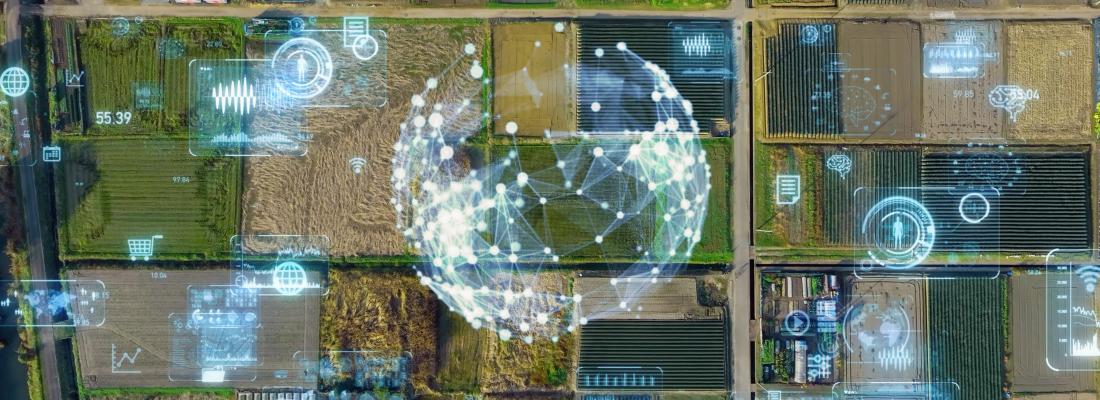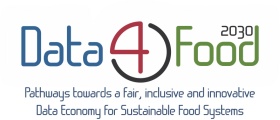Reading time 5 min
Data4Food2030: a Horizon Europe project for a fair, inclusive and innovative data economy to support sustainable food systems
Published on 28 March 2023

Isabelle Piot-Lepetit, an economist at INRAE's MoISA research unit in Montpellier, is coordinating the section of the project that focusses on broadening knowledge about the data economy for food systems. She gave us an overview of Data4Food2030's objectives and implementation.
What are the issues raised by Data4Food2030 and what are its objectives?
IPL: Big data, which are a very powerful tool available to us, have to be reconstructed, analysed and explained in order to be used effectively for food systems. That's why the European Data4Food2030 project is focussing on issues related to good data management so as to help make European food systems more sustainable, both socially and environmentally. Every day it becomes easier to use technology. Large amounts of funding are spent on the technical sciences and big data, but it is also important to look at the effect that such data have on science as a whole, and whether or not those who share their data have confidence in the way they are used. Data-based innovations are now reshaping the ways we produce, consume and share foodstuffs. That's why they are transforming our economy and our society, and such change is both rapid and profound.
Issues related to confidence in and ownership of data and concerns that data can be misused to create positions of monopoly are still widespread. Up to now, funding has been channeled into advancing and adopting new technologies, but the challenge is not so much technological developments as it is their social context. That's why a climate of confidence - which has to be built between all the stakeholders including marginalised groups whose access to data has been limited due to their gender, geographic location and/or their ethnic origins - is vital for developing good data management in food systems.
Data4Food2030 will help offer solutions for monitoring the data economy and organising its governance. It will also involve giving users key information so they know how data are processed and how to have confidence in them.
How are the partners working together to answer those questions?
IPL: The 24 partners from 12 countries in Europe, coordinated by Wageningen Research in the Netherlands, are networking to work together to come up with a conceptual framework of the data economy for food systems and assess its sustainability, equity and inclusiveness. To do that, they are basing themselves on a literature review and on empirical research with a view to ultimately monitoring the development, performance and impact of the data economy for food systems.
The project includes participants from nine EU countries that are part of nine case studies. These stakeholders on the ground provide food-system related services in 27 EU countries, involving 38 partners and many associate partners such as suppliers or consumers.
These nine case studies provide tangible examples of the data economy by deploying data and technology. Those examples are studied to map and improve the data economy so as to promote fair and inclusive business models in this sector. They cover a variety of areas such as food production, the supply chain and the circular economy.
Each case study raises a specific issue in order to better understand the data space in context. For example, data collected on pig farms in France will make it possible to gauge the impact of health measures, improve daily management by farmers and meet consumers' expectations with regard to traceability and animal welfare. Another case study concerns the city of Amsterdam's project to become fully circular by 2050. As part of those efforts, there is a need to understand how to enhance data on waste streams so as to create economic, social and environmental information for stakeholders striving to reduce and reuse urban food waste.
What results are expected at the end of the project?
IPL: Data4Food2030 aims at improving the future status of the data economy for food systems. Design principles, recommendations and clear solutions will be proposed to achieve the future we are striving for. That will make it possible to enhance and adapt polices and practices on both the public and private levels. The involvement of all the stakeholders is vital for Data4Food2030. So, to increase the project's impact on the food system, our participants are fully committed to providing their contributions on various data economy concepts and assessing the project's results.
Data4Food2030 is laying down pathways to an equitable, inclusive and innovative data economy for European food systems and plans to measure the data economy's value in such systems.
What is INRAE's role in the Data4Food2030 project?
IPL: INRAE, which I am representing as leader of Data4Food2030's Work Package 1, is in charge of bringing together expertise and knowledge to set out the conceptual framework and define what the data economy in food systems is.
INRAE will host a variety of events as part of Data4Food2030, such as research workshops, seminars, brainstorming sessions, etc. In addition, in a view to open science, several papers will be submitted to international scientific literature journals.
The project benefits from the expertise of scientists from INRAE's Economics and Social Sciences Division's MoISA and GAEL research units. The MoISA joint research unit is in charge of drafting a definition and conceptual framework for the data economy in food systems by reviewing relevant scientific literature. This conceptual framework will give an overview of the drivers, obstacles, trends and opportunities and their links to positive and negative impacts. This knowledge base will go above and beyond economic and technological aspects by paying special attention to environmental, ethical, legal and society-related factors such as equity, confidentiality, inclusiveness, consumer protection and impact on political objectives. The GAEL joint research unit is in charge of advanced theoretical study of the data economy for food systems, particularly on the role of platforms and merger and acquisition strategies upstream from the agricultural sector.

Data4Food2030 in a nutshell
Coordination: George Beers, Stichting Wageningen Research
Teams: Stichting Wageningen Research (Netherlands), Foodscale Hub Greece (Greece), INRAE (France), IAMM (France), ILVO (Belgium), ATB Institut für angewandte Systemtechnik Bremen (Germany), Wageningen University (Netherlands), The Lisbon Council For Economic Competitiveness ASBL (Belgium), Vrije Universiteit Brussel VUB (Belgium), Netcompany-Intrasoft (Luxembourg), Stichting Effost (Netherlands), EuroFIR (Belgium), Nodibinajums Baltic Studies Centre (Latvia), SGGW (Poland), Fondation Jean Jacques Laffont, TSE (France), Euro Pool System International (Germany), Anysolution SL (Spain), ITC – Innovation Technology Cluster (Slovenia), Wirelessinfo (Czech Republic), 1001 Lakes Oy (Finland), Agdatahub (France), IFIP Institut du Porc (France), University of Maribor (Slovenia), Uhlava OPS (Czech Republic), Luonnonvarakeskus (Finland)
Funding: HORIZON-CL6-2021-GOVERNANCE-01-18 - Mapping and improving the data economy for food systems, Grant agreement: 101059473
Budget: EUR 10 M
Timeline: September 2022 – August 2026 (48 months)
Website: https://data4food2030.eu/
